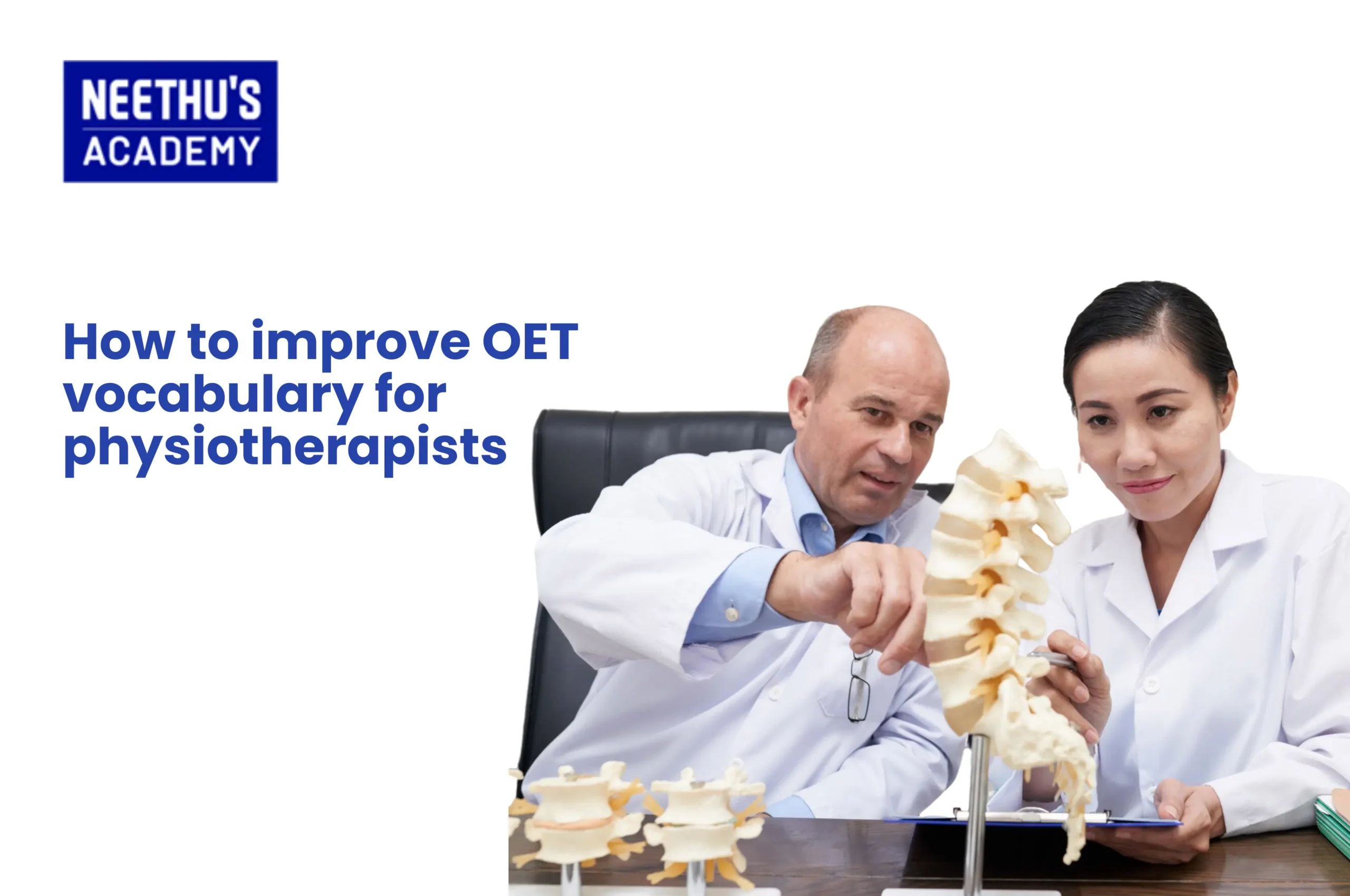The Occupational English Test, otherwise known as OET, is a professional test on language proficiency for healthcare professionals. Becoming great at reading…

How To Improve OET Vocabulary For Physiotherapists
Are you a physiotherapist who wants to work or move to an English-speaking country? Then, passing the OET (Occupational English Test) is probably on your agenda. Compared to other English tests, OET is designed for healthcare professionals, as the vocabulary used is unique to each branch of medicine. For a physiotherapist, some examples include anatomy, treatment procedures, rehabilitation vocabulary, and patient communication sentences.
To excel in all four components, including Listening, Reading, Writing, and Speaking, you must enhance your OET physiotherapist vocabulary. Through this blog, you will gain insights into typical problems, get OET vocabulary tips and recommended resources, and learn how the proper OET coaching centre can boost your achievement.
Understanding OET for Physiotherapists
The OET test is accepted worldwide and is an essential qualification for health professionals, such as physiotherapists, to work in the UK, Australia, New Zealand, and the UAE.
The test comprises:
Listening: After patient consultations and lectures
Reading: Translating healthcare texts and case notes
Writing: Drafting a referral or discharge letter unique to physiotherapy
Speaking: Role-playing professional-patient interactions
All these parts need an in-depth knowledge of OET physiotherapy vocabulary, particularly diagnosis, patient management, and treatment process terminologies.
Typical Vocabulary Issues
Most OET candidates who are physiotherapists have certain language-related issues:
Technical Terms: Terms such as “mobilisation,” “orthotics,” or “proprioception” are necessary but are never used outside the clinic.
Paraphrasing and Synonyms: Ability to understand various ways of describing the same clinical concept.
Simplifying Language: Translating complicated terms into layman’s terms while communicating with patients.
Accent and Pronunciation: Foreign speakers may have difficulty pronouncing medical terms correctly.
Strategies to Improve Vocabulary
The following are smart ways to enhance OET vocabulary for physiotherapists:
1. Have a Personal Glossary
Develop a vocabulary book with words you find in reading texts or practice exams. Classify them by topic—i.e., Neurology, Orthopaedics, Geriatrics.
2. Utilize Flashcards for Memorization
Apps such as Quizlet or Anki enable you to create electronic flashcards. Add the word, definition, example sentence, and synonyms to aid retention.
3. Learn from Context
Watch physiotherapy tutorial videos, subscribe to YouTube channels, and peruse professional magazines. This lets you know how words are used in actual circumstances.
4. Practice with OET Mock Tests
Rehearsing sample tests or past papers increases exposure to common phrases in actual OET situations. It also enables the use of vocabulary under time pressure.
5. Role-Playing
Practice role-plays on physiotherapy scenarios. Practice with classmates or join a speaking club to become confident and fluent in applying OET physiotherapy vocabulary.
6. Daily Word Target
Set a word target for the day
Commit to learn five new words every day. Practice using them in speaking and writing to develop long-term retention.
Recommended Resources
It is easier to build vocabulary when you have the appropriate resources. Below are some suggested tools for OET vocabulary practice:
English for Physiotherapy by Virginia Allum: A specialised vocabulary book for physiotherapists sitting for OET.
Official OET Website: Provides profession-specific sample tests and vocabulary lists.
BBC Learning English: Great for improving general medical English and pronunciation.
Mobile Apps: Download apps like “OET Practice,” “OET Vocabulary Builder,” and “Quizlet” for on-the-go learning.
Best OET Coaching Centre in Kerala
While self-study is valuable, joining a professional OET coaching centre can provide the structure and mentorship needed to achieve top scores. Here’s how Neethu’s Academy, the best OET Coaching center in Kerala, helps their students:
Targeted Vocabulary Sessions: Focused on physiotherapy scenarios
Expert Mentors: Educators with experience in teaching healthcare providers
Peer Practice: Practices to work with other physiotherapists
Mock Exams and Evaluations: Mimic actual test environments to gain confidence
Feedback-Based Learning: Individualized feedback to correct and enhance your application of terminology
The right coaching centre can bridge the gap between generic English and profession-related communication.
What makes us stand out:
Profession-Specific Training: Individual modules for physiotherapists, nurses, doctors, and others.
Experienced Faculty: Instructors with practical experience in both healthcare and English.
Flexible Learning Modes: Online and offline classes to accommodate your schedule.
High Success Rate: A history of top-scoring candidates.
Customised Vocabulary Modules: OET physiotherapist vocabulary with special emphasis.
Mock Test Series: Regular testing with extensive feedback.
If systematic learning and assured improvement are what you need, Neethu’s Academy is the best option among Kerala’s OET coaching institutions.
Conclusion
When learning OET physiotherapists’ vocabulary, it’s not merely a matter of memorising challenging terms; you’re learning how the words are being used in actual clinical situations. Whether you’re educating patients, writing referral letters, or reading case notes, solid vocabulary helps you to do a better job in all four of the modules.
By practicing the day-to-day words, wise usage of smart tools, and guidance by a reputed OET coaching center such as Neethu’s Academy, you will be redefining your preparation and closer to your international career aspirations. Remember that the journey is tough, but the rewards will be worth the efforts.
Frequently Asked Questions
Practice daily through flashcards, context practice, and profession-specific exercises.
It is an English proficiency test for health professionals, including physiotherapists, to practice in English-speaking countries.
The Writing module is usually the most challenging because of its pattern and accuracy in vocabulary.
Rehearse role-plays using actual scenarios and rehearse proper physiotherapy-related terminology confidently.
Related Blogs
- All Posts
- OET
Course Enquiry
Latest Posts
- All Posts
- canada
- CBT
- DHA
- French
- GENERAL
- German
- Haad
- IELTS
- IQN NEW ZEALAND
- MOH
- NCLEX-RN
- NHRA
- OET
- OSCE
- Pearson Vue
- PROMETRIC
- PTE
- TOEFL
- Back
- NCLEX - NGN
- Back
- OET FOR PHYSIOTHERAPIST
- OET FOR PHARMACIST
- OET FOR DOCTORS



